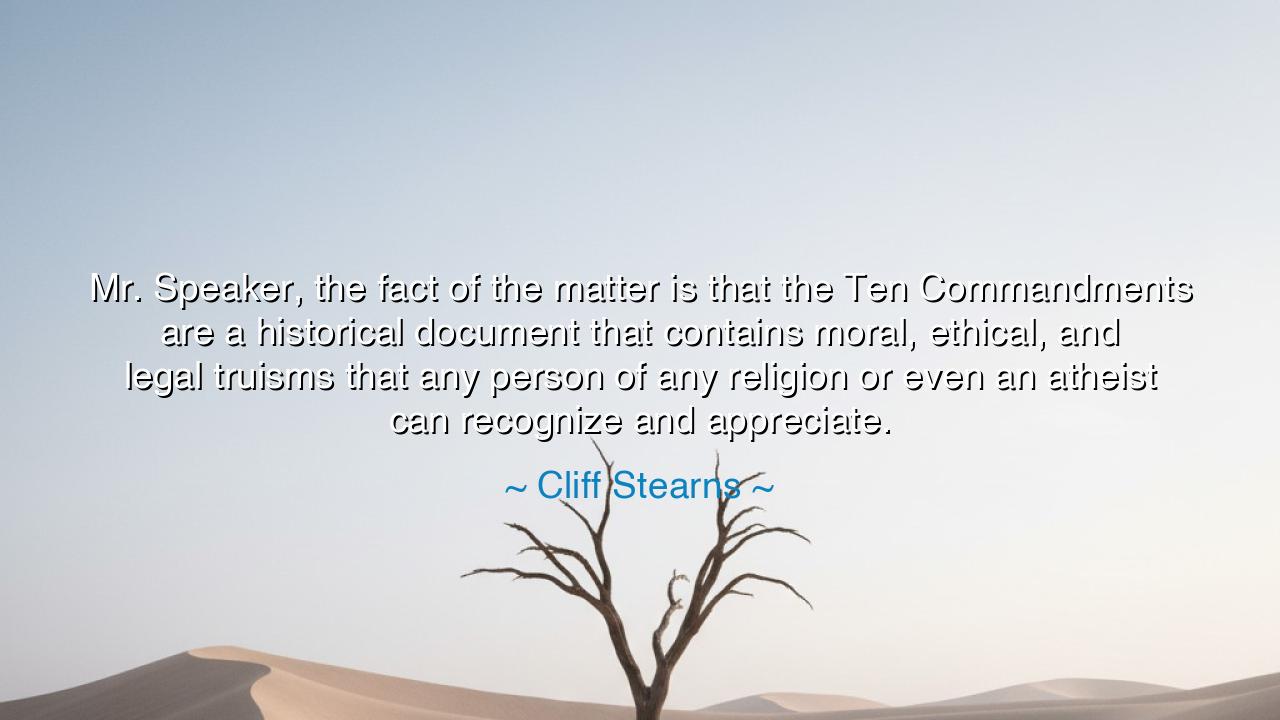
Mr. Speaker, the fact of the matter is that the Ten Commandments
Mr. Speaker, the fact of the matter is that the Ten Commandments are a historical document that contains moral, ethical, and legal truisms that any person of any religion or even an atheist can recognize and appreciate.






In the words of Cliff Stearns: “Mr. Speaker, the fact of the matter is that the Ten Commandments are a historical document that contains moral, ethical, and legal truisms that any person of any religion or even an atheist can recognize and appreciate.” These words summon us back to the roots of civilization itself, to a time when peoples newly gathered in nations sought guidance not only from kings and laws, but from enduring principles that transcended tribe, creed, and age. The statement is not a call to sectarian faith, but to a recognition that within the Commandments lie universal truths, as enduring as stone, carved not only upon tablets but upon the heart of humanity.
The ancients understood that without shared standards, no society can endure. From the code of Hammurabi in Babylon, to the laws of Solon in Athens, to the Commandments given at Sinai, mankind has sought guidance that binds chaos into order. Stearns reminds us that the Ten Commandments, though born in a religious tradition, stretch far beyond it. Their essence—honor, truth, fidelity, respect for life and property—is not bound to one people, but belongs to all. Thus, even the atheist, though denying the divine origin, can still recognize their wisdom as the pillars upon which civil society rests.
Consider the command, “Thou shalt not steal.” This is not merely a religious injunction; it is the foundation of trust upon which commerce, community, and cooperation depend. Where theft reigns, trust dies, and without trust no city can stand. Or, “Thou shalt not kill.” This principle reaches beyond creed, for no society can flourish when life is cheapened and violence reigns. Such laws are not only sacred; they are practical, binding the wildness of man into the peace of civilization. Stearns’s words remind us that these truths are not relics, but living guides for every generation.
History itself affirms this. When the American Founders spoke of “self-evident truths” and “unalienable rights,” they echoed the wisdom of these ancient truisms. The idea that justice must be rooted in moral principle was not new, but inherited from traditions older than the republic. The Commandments were often displayed in courthouses, not as symbols of one faith, but as acknowledgment that justice flows from moral order, not merely from power. To deny their influence is to deny the lineage of law itself.
And yet, Stearns’s statement also carries a warning. In times of discord, there is a temptation to dismiss the ancient simply because it is ancient, to discard wisdom because it wears the garb of religion. But the ancients knew better: truth is truth, no matter its clothing. A river does not cease to quench thirst because it flows from a mountain sacred to another tribe. Likewise, the Ten Commandments, though born in faith, quench the thirst for justice in every society that honors their spirit.
This does not mean one must kneel at the same altar, or chant the same prayers. It means only that we must not despise what has been proven good. The ethical principles of honesty, respect, fidelity, and restraint are not chains but foundations. They are not meant to enslave, but to preserve the dignity of all. The wise man sees this and takes the gift, regardless of the name of the giver.
So let this lesson be carried forth: do not cast aside the wisdom of the ancients simply because you do not share their creed. Embrace the truisms that unite rather than divide. In your own life, practice honesty, respect your neighbor, honor your commitments, preserve life, and seek truth. These are not the treasures of one faith alone, but of all humanity. For a society that honors these principles will endure, while one that rejects them will crumble, no matter how mighty its armies or how vast its wealth.
Thus, the teaching stands: the Ten Commandments are not merely relics of stone, but living pillars of order, justice, and peace. Recognize them, cherish them, and pass their wisdom to the next generation, for in doing so, you build not only a nation of laws, but a civilization of harmony and strength.






AAdministratorAdministrator
Welcome, honored guests. Please leave a comment, we will respond soon